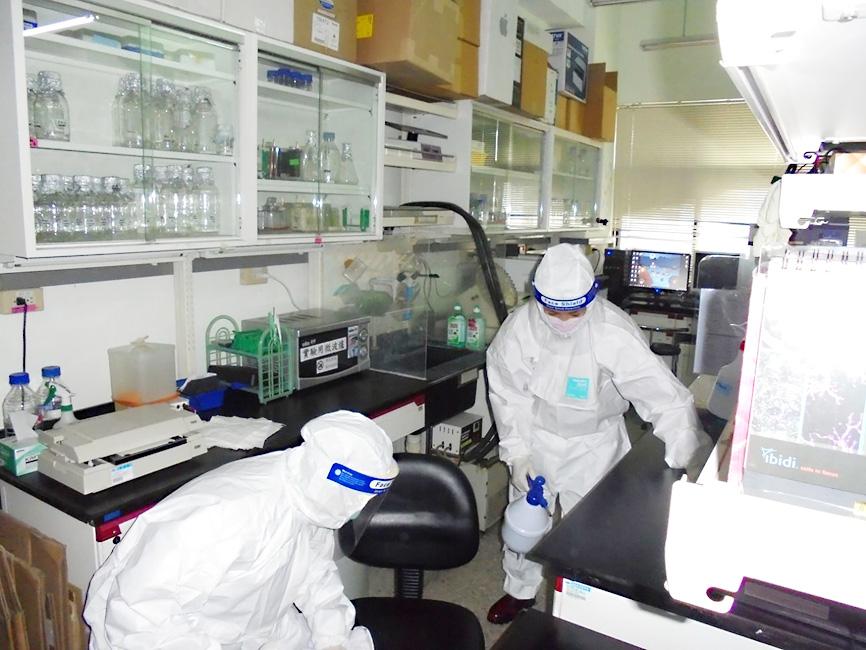The Central Epidemic Command Center (CECC) yesterday said it was easing regulations for home quarantine, as the number of COVID-19 cases rises, but with a large majority reporting no or mild symptoms.
As local community spread might continue to expand, Minister of Health and Welfare Chen Shih-chung (陳時中), who heads the center, said that home quarantine rules for contacts of local cases have been eased.
The policy of one person per room with an exclusive bathroom has been relaxed to allow people living in the same house to quarantine together, but they must disinfect shared bathrooms after every use, he said.

Photo courtesy of Hualien Tzu Chi Hospital via CNA
The new rules do not apply to inbound travelers, who must follow the policy of one person per room, he added.
The CECC also reported 281 local COVID-19 infections, marking the highest daily case count this year, and 78 imported cases, including 27 people who tested positive upon arrival at the airport on Tuesday.
The 281 local cases were from 17 cities and counties, including 115 in New Taipei City, 45 in Taipei, 37 in Kaohsiung, 26 in Keelung, 17 in Taoyuan and 12 in Hsinchu County, Chen said.
As of 8am yesterday, 163 of the cases had no known sources of infection and were undergoing contact tracing, CECC data showed.
Chen said 40 cases are linked to a cluster in New Taipei City, and most of them are students and their close contacts; 32 cases are linked to a cluster in Keelung; a cluster of 12 new cases were reported among workers and close contacts of a business venue in Kaohsiung; and eight new cases involved workers at a business venue in Taipei.
The two clusters in Kaohsiung and Taipei are business venues with more “complicated” customers, he said.
In addition to the two clusters, Chen said the cluster in New Taipei City involving relatives and schools, the Keelung cluster and a cluster involving a dance studio in Taoyuan, are five chains of local transmission that need to be closely monitored.
Centers for Disease Control Deputy Director-General Philip Lo (羅一鈞), deputy head of the CECC’s medical response division, said it is now difficult to clearly determine the number of transmission chains with unknown infection sources, as community infection has spread to several cities and counties.
The current focus of contact tracing is to contain the virus’ spread, rather than tracing their possible source of infection, he said, adding that most of the local transmission chains are infected with the Omicron BA.2 subvariant of SARS-CoV-2.
Chen said that contact tracing would become increasingly difficult if case numbers continue to surge.
Better technology methods must be used to simplify the precise contact tracing, rapid and polymerase chain reaction tests must both be conducted and case classification is very important to preserve healthcare capacity, he added.
As of Tuesday, the booster dose vaccination rate had reached 51.01 percent, he said.
As people visiting special recreational venues with escort services are required to receive the booster dose, he said it is likely that the booster dose vaccination status would be required in more types of venues in the near future.

‘ABUSE OF POWER’: Lee Chun-yi allegedly used a Control Yuan vehicle to transport his dog to a pet grooming salon and take his wife to restaurants, media reports said Control Yuan Secretary-General Lee Chun-yi (李俊俋) resigned on Sunday night, admitting that he had misused a government vehicle, as reported by the media. Control Yuan Vice President Lee Hung-chun (李鴻鈞) yesterday apologized to the public over the issue. The watchdog body would follow up on similar accusations made by the Chinese Nationalist Party (KMT) and would investigate the alleged misuse of government vehicles by three other Control Yuan members: Su Li-chiung (蘇麗瓊), Lin Yu-jung (林郁容) and Wang Jung-chang (王榮璋), Lee Hung-chun said. Lee Chun-yi in a statement apologized for using a Control Yuan vehicle to transport his dog to a

Taiwan yesterday denied Chinese allegations that its military was behind a cyberattack on a technology company in Guangzhou, after city authorities issued warrants for 20 suspects. The Guangzhou Municipal Public Security Bureau earlier yesterday issued warrants for 20 people it identified as members of the Information, Communications and Electronic Force Command (ICEFCOM). The bureau alleged they were behind a May 20 cyberattack targeting the backend system of a self-service facility at the company. “ICEFCOM, under Taiwan’s ruling Democratic Progressive Party, directed the illegal attack,” the warrant says. The bureau placed a bounty of 10,000 yuan (US$1,392) on each of the 20 people named in

The High Court yesterday found a New Taipei City woman guilty of charges related to helping Beijing secure surrender agreements from military service members. Lee Huei-hsin (李慧馨) was sentenced to six years and eight months in prison for breaching the National Security Act (國家安全法), making illegal compacts with government employees and bribery, the court said. The verdict is final. Lee, the manager of a temple in the city’s Lujhou District (蘆洲), was accused of arranging for eight service members to make surrender pledges to the Chinese People’s Liberation Army in exchange for money, the court said. The pledges, which required them to provide identification

INDO-PACIFIC REGION: Royal Navy ships exercise the right of freedom of navigation, including in the Taiwan Strait and South China Sea, the UK’s Tony Radakin told a summit Freedom of navigation in the Indo-Pacific region is as important as it is in the English Channel, British Chief of the Defence Staff Admiral Tony Radakin said at a summit in Singapore on Saturday. The remark came as the British Royal Navy’s flagship aircraft carrier, the HMS Prince of Wales, is on an eight-month deployment to the Indo-Pacific region as head of an international carrier strike group. “Upholding the UN Convention on the Law of the Sea, and with it, the principles of the freedom of navigation, in this part of the world matters to us just as it matters in the